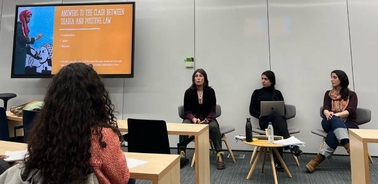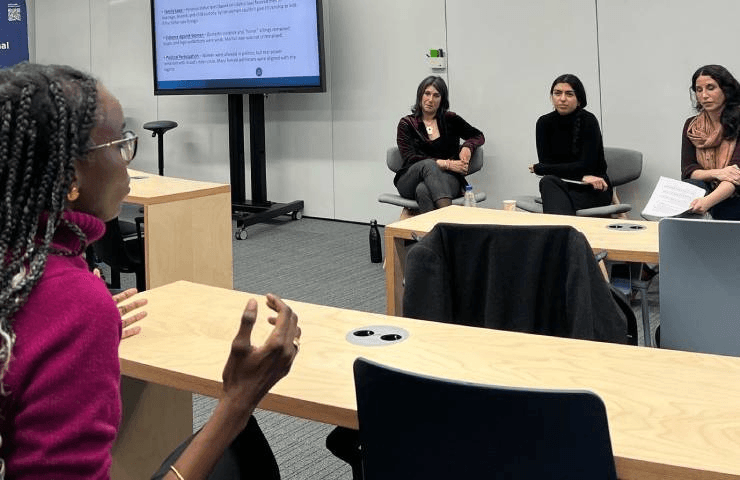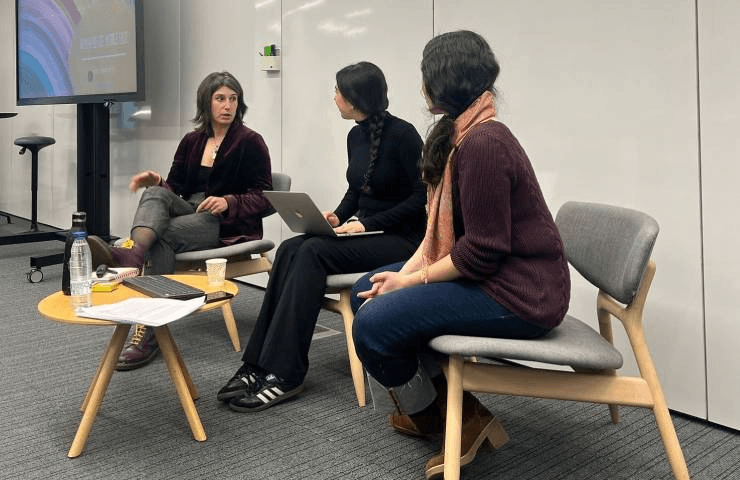- Home
- News And Events
- News
- Feminist Waves In The Middle East: A Lively Discussion At Ie University
Feminist Waves in the Middle East: A lively discussion at IE University

Students and faculty gathered to explore how feminism has progressed in the Middle East.
How does feminism intersect with Islam? What does it mean to advocate for women’s rights in the Middle East today? These were the questions posed at “Feminist Waves in the Middle East”. This extracurricular talk was a collaborative effort between IE Language Center, IE Girl Up Club, IE Mena Club and IE School of Politics, Economics & Global Affairs. This event is further evidence of IE University’s commitment to championing diversity in all its forms—with an ongoing spotlight on women of all backgrounds.

The event kicked off with María José Aquino’s presentation on the development of women’s rights across different Arabic nations. María José delved into the differences between Arab feminism and Islamic feminism throughout the 20th and 21st century, challenging participants to reflect on the meaning of feminism and whether it can coexist with religion—or whether it has to. María José also outlined the differences between family law and constitutional law, and how their co-existence results in ambiguities that perpetuate humanist crimes against women.
The second half of the evening saw Regina present a case study on women in Syria. Regina covered the nation’s history of feminism, focusing on the challenges posed by the Al-Assad regime, ISIS and the ongoing war. Regina also pointed to the hope generated during the Arab Spring, as well as highlighting the ongoing efforts of organizations like Maniya who advocate for a democratic future in Syria. Regina’s presentation concluded with a video from Maniya, through which the organization’s CEO outlined their vision: “Today, with the end of the year, the Assad regime has collapsed, and its civil status is changing… Civil society will unite with Syrian societies to enable them to participate in decision-making and achieve their goals.”
The talk platformed a number of students to share their own insights of the female experience in Arabic countries. Lively discussions ensued around the different perspectives between urban and rural countries, along with debates on whether women face oppression due to Islam itself or male interpretations of Islam. A native Sudanese student pointed to the evolution of the female-Muslim experience when living in Saudi Arabia: “The last four years in Saudi Arabia have been amazing. Women have argued a lot to be able to form groups, though deep down inside, people are still politically hesitant. But at least it’s acceptable that they can go where they want, they can walk in the street if they want.”
The back-and-forths of the event are testament to the vitality of thought being nurtured at IE School of Politics, Economics & Global Affairs. All participants were respectful of each other’s opinion, with a number of sensitive issues approached with care and thoughtfulness. IE University should be proud of such a bright selection of young people studying in their classrooms.
